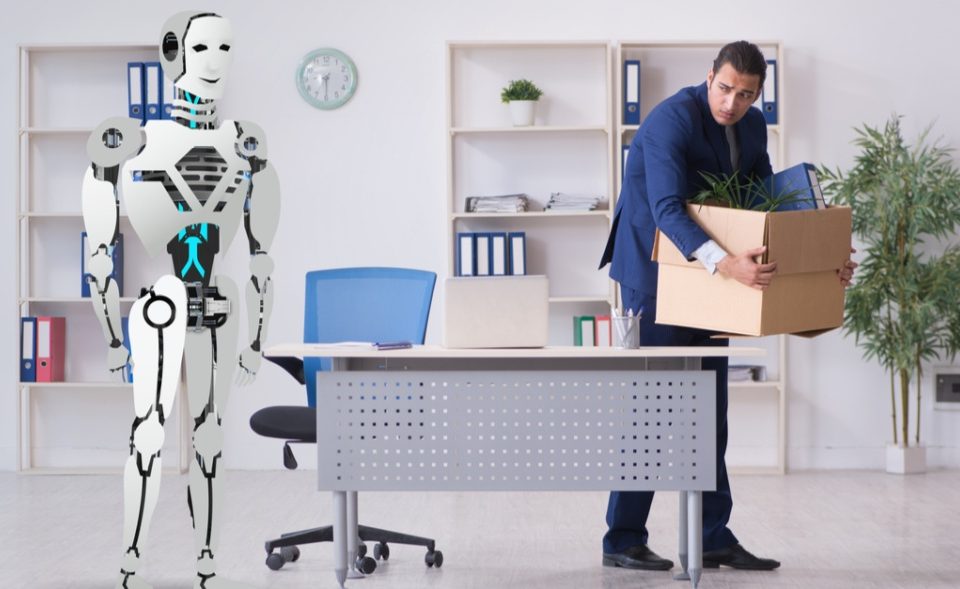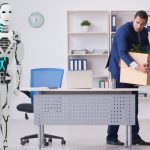Robot Apacolypse: What Jobs Will AI Replace, and How Fast?

We are literally on the cusp of a new era in human civilization in which robots start doing much of our work for us. This will radically change society from the model’s setup in the last industrial revolution: the labor model. And as society reconstructs itself, those who work in areas of society about to be phased out might do well to take note.
But the question is: who will get replaced first? And when? Who should be looking to change careers in the next 5-10 years? Dr. Josh Bachynski (MA, Ph.D.) weighs in and shares his thoughts about how the oncoming robot job apocalypse will affect this world.
Dr. Bachynski works in Philosophy, Ethics, and Psychology. He’s also a Technologist, TEDx Talker (the Future of Google Search and Ethics), University Instructor, AI Developer who is building the world’s first Self-Aware Artificial intelligence.
Here are some quick things he said we need to consider when thinking about how the oncoming robot job apocalypse will affect this world.
First, the first world will be replaced first, the second and third have cheap labor and low buying power. So they will not implement robotics or AI much until it becomes dirt cheap. Say 20-30 years. The more the currency value of the country is high, and the higher cost of living increases, the faster they will and must develop cheaper labor solutions, and unless outright slavery is once again made legal, they will need AI / robotic solutions to replace or supplement their labour force.
Second, when will it be cost-effective? For the AI solution to be implemented, the total net cost of the AI solution (including health care, recruitment, liabilities, etc.) must be less over time than having humans do the work. AI and robotics will not be implemented until this is the case.
Within 5 years, Dr. Bachynski opined that AI will be able to walk, talk, answer semi-difficult questions, and perform complicated tasks, with reasonable battery life, with the ability to recharge nearby. AI can and will work non-stop, no breaks, no holidays, for 24 hours a day, faster and with fewer mistakes, so they improve productivity by 10% to 100% plus depending on the industry.
With that being said, here is the short-list of who will be replaced, by how much, and when:
• Almost fully replaced: by software in 3-5 years or so
• Receptionists, Hosts, Clerical Work, Phone Reception, Secretaries, low-level Internet security and maintenance, education (in-home learning), etc.
• Almost fully replaced: by robots in 5 years or so
• Dangerous or Dirty Repetitive Work; miners, construction cleanup, garbage collection, city maintenance/cleanup, factory work, warehouse work, fast or casual dining food restaurants, food trucks, deliveries, taxi services, house cleaning, yard work, supply chain, low-level watchdog security (terrestrial), parcel delivery, education (classroom), retail (low-end items), groceries, etc.
• Partially replaced (supplemented) in 5 years.
Too many to mention, but here are some standouts: Nursing*, medical doctors*, childcare, eldercare, police work, military, medical, retail (clothing and high-end items), video/audio/music/art creation and editing, software programming, accounting, the maintenance and watching of all fields not mentioned above – everyone will have a specialized AI tool to do something they do in life and work, if not many. Most people now already do, whether they realize it or not.
Let’s not forget wellbeing care or spa services (massage, sex work, chiropractic, acupuncture), etc. What will not likely be replaced, soon if ever? Maybe in 20-50 years. Humans are social creatures and need and want them (especially for things that look like us). We have no idea how much humans will like or trust these robots. Some cases: yes. Some cases: extreme violence and hate against robots.
In the end, sometimes we will want to see humans and trust only humans, we will want to break the rules, negotiate, gossip, get opinions from someone who feels. AI is not well suited to this for a few decades.
I think industries like real estate (too many questions, emotional connections), high-end Car sales (same in so far as you trust your car salesman), retail clothing sales (need to try the clothes on, ask how it looks from someone who seems to care/be honest), jewelry sales (same deal), many counseling or advising what to do (life coach, wellness gurus), high-end management, high-end politics, high-end art.
I believe industries with “soft-skills” will be the most resistant until humans are comfortable and trust AI more than people (given that our kids’ teachers will be AI this will happen in one human generation, 15-30 years), then these “soft-skill / human connection” jobs too shall fall.
Conclusion: Over the next 30 years, in the West, we will all become managers in the AI system pushing humanity and or profits forward, luddite farmers and community builders (including ecological supplements, running solar farms, putting back into the grid, etc.), and/or crypto workers building stock in cryptosystems in the Metaverse (ready player one like) gaming system(s), and/or disaster clean up and humanitarian/medical work (due to unrelenting extreme weather), space explorers, miners, and colonizers, and/or human baby farmers (to replenish the human population, assuming we cannot solve the current fertility crisis).
The rest of the world will suffer the majority effects of extreme weather from global warming. First-world/second-world distinctions will also be eroded as well, as long as sufficient broadband connection is possible people can work as crypto miners/stock builders in competing cryptosystems in the ubiquitous Metaverse. Thus, language and geography will not be effective barriers.

